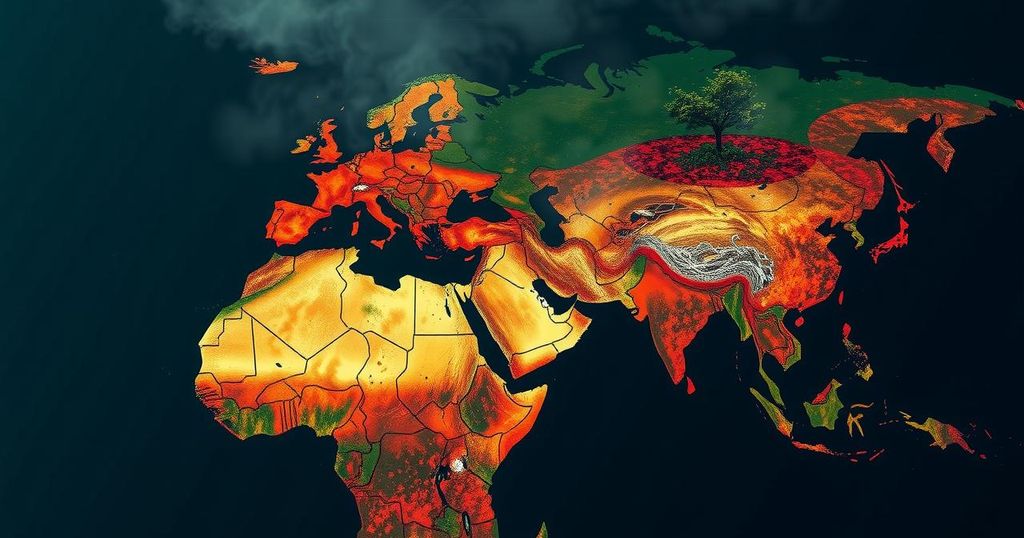COP29 Summit: Navigating the Complexities of Climate Finance

The COP29 summit in Baku has witnessed ongoing negotiations over climate finance, revealing a stark divide between developed and developing nations. Developed countries propose raising climate finance to $300 billion, but developing nations argue this falls significantly short of the $1 trillion needed annually by 2030. Pakistan faces a notable climate finance gap, and discussions are complicated by differing views on financial responsibilities, alongside newly heightened uncertainties in U.S. climate policy.
The COP29 climate summit in Baku has exceeded its scheduled timeframe as negotiations continue, revealing critical divisions regarding climate finance. A key issue has been the establishment of a New Collective Quantified Goal for climate finance, with developed nations resisting concrete commitments amidst expectations that they would lead in financial support, having historically contributed the most to greenhouse gas emissions. While wealthy countries propose increasing climate finance to $300 billion, developing nations, such as Pakistan, emphasize that the actual financial requirement stands at least at $1 trillion annually to meet Paris Agreement targets by 2030.
Pakistan faces a staggering climate finance gap of $348 billion by 2030, underscoring the urgency for increased contributions from wealthier nations. There remains a significant divergence between the financing needs of vulnerable nations and the commitments offered by wealthier states. Reports indicate that some developing nations, frustrated by inadequate proposals, considered withdrawing from discussions altogether. This situation is further complicated by differing views on which nations should carry financial responsibilities, with European nations advocating for contributions from high-emitting economies like China and the Gulf states.
Moreover, the impact of the recent U.S. presidential election has cast a shadow over negotiations, as many suspect that the incoming administration, epitomized by Donald Trump’s skepticism of climate change, might impede any progress on the climate finance agenda. Amidst these tensions, Pakistan’s negotiator, Arif Goheer, expressed discontent with the agreements being discussed, calling the draft disappointing. Despite Pakistan’s proactive measures, such as the National Climate Finance Strategy and the Recharge Pakistan initiative, achieving financial backing remains arduous due to overwhelming bureaucratic hurdles.
In the ongoing discussions, it is crucial for the international community to understand that climate finance transcends mere figures; it is about equipping vulnerable nations to navigate and adapt to an existential crisis for which they bear minimal responsibility. The trajectory of these negotiations remains uncertain, yet the necessity for a fair and sustainable climate finance solution persists.
Climate finance is essential for supporting developing nations disproportionately affected by climate change, despite being the least culpable contributors to the crisis. Events like the COP29 serve as critical platforms for negotiating financial commitments from wealthier nations, whose historical emissions have significantly impacted global climate systems. As vulnerable countries seek to secure ample funding to mitigate climate risks and fulfill their obligations under international agreements such as the Paris Accord, the debates surrounding climate finance often reveal deep-seated inequalities and conflicting interests within global governance frameworks.
In summary, the COP29 negotiations illustrate the significant challenges pertaining to climate finance, particularly the disconnect between the financial commitments made by wealthy nations and the pressing needs expressed by developing countries. While some progress has been suggested, the inadequate funding and bureaucratic barriers threaten the ability of vulnerable nations to respond effectively to climate change. Moving forward, it is imperative that the global community recognizes climate finance as a crucial mechanism for justice and sustainability, ensuring that those least responsible for the crisis receive the support necessary to survive and thrive.
Original Source: asianews.network






